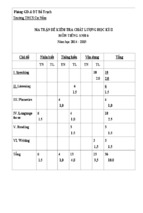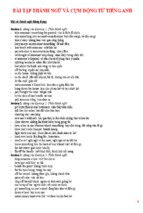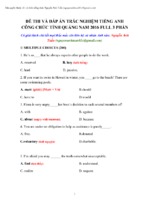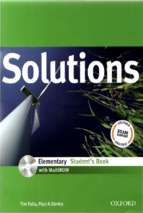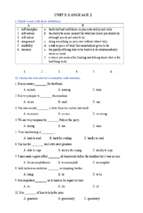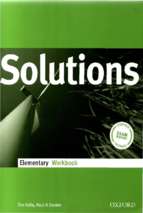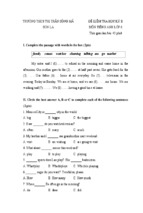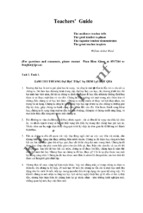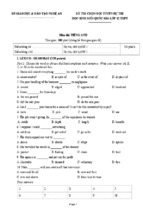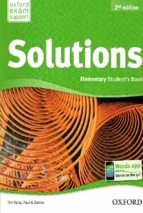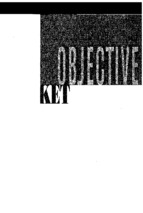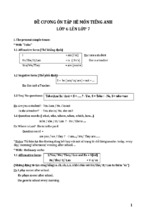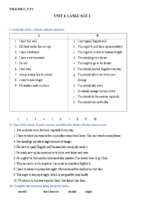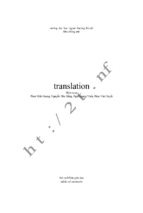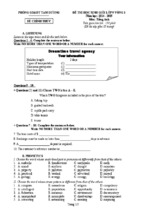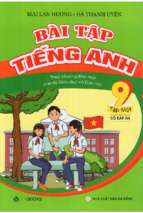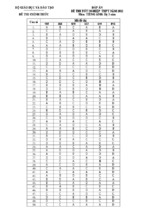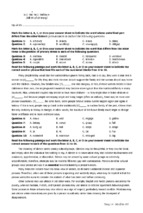Ôn thi tốt nghiệp môn tiếng anh bao gồm nhiều đề thi tiếng anh hay
Period 1: THÌ HIỆN TẠI ĐƠN
A_ Công thức:
* Đối với động từ thường:
_ Khẳng định: I/ You / We / They/ CN số nhiều
+
V (Nguyên mẫu)
She/ he / it/ CN số ít
+
V–es/ V–s
_ Phủ định:
I/ You / We / They/ CN số nhiều
+ donotV (Nguyên mẫu)
She/ he / it/ CN số ít
+
doesnot +
V(nguyên mẫu).
_ Nghi vấn:
Do + I/ You / We / They/ CN số nhiều +
V (Nguyên mẫu)?
Does She/ he / it/ CN số ít
+
+
V(nguyên mẫu)?
Do / does
+ S
+
V(nguyên mẫu)?
Đối với động từ “to be” ở thì hiện tại đơn ta có 3 dạng
Khẳng định:
I
+ am
You/ we/ they/ CN số nhiều
+ are
She /he/ it/ CN số ít
+ is
Phủ định: Thêm “not” sau “am / is/ are”
Nghi vấn: Đặt “Am/ is/ are” ra trước chủ ngữ.
Đối với động từ “To have” thì ở ngôi thứ 3 số ít ta không thêm đuôi “_S/ _ES” mà chuyển thành “has” (She
has a new house)
B_ Cách dùng:
1_ Để diễn tả một thói quen hoặc một sự việc xảy ra có tính chất thường xuyên và thông lệ ở hiện tại. Trong câu
thường có các trạng từ như: often ; usually; always; sometimes; seldom; on Mondays; On Sundays; everyday;
every Monday; every summer...
We come to school on time everyday.
My mother always gets up early.
Does Mr Green go to work five days a week?
_ Yes, he does
We do not go to school on Sundays.
2_ Để diễn tả một sự thật hiển nhiên, một chân lý:
The earth goes round the sun.
3_ Dùng để nói về thời khóa biểu hay chương trình: The film begins at 8p.m.
4_Dùng trong mệnh đề điều kiện trong câu điều kiện loại I và trong mệnh đề điều kiện chỉ thời gian.
C_ Cách thêm đuôi “_s” hay “_es” sau động từ:
1_ Thông thường chúng ta thêm đuôi _S sau động từ ở ngôi thứ 3 số ít:
work _ works play _ plays
change _ changes
2_ Những động từ kết thúc bằng _CH; _SH; _ SS; _X hay _O ta thêm đuôi _es
watch _ watches
wash _ washes finish _ finishes
3_ Những động từ kết thúc bằng “Y” mà trước nó là một phụ âm thì ta chuyển “Y” thành “I” sau đó thêm đuôi _es:
carry _ carries
fly _ flies
D_ Cách phát âm đuôi s và es:
- Những động từ tận cùng là các âm /p,k,t,f,0/ khi thêm ‘s’ thì đọc thêm âm /s/
VD: gets, works…
- Những động từ tận cùng là các âm /s, z, x, tS, S, dz/ khi thêm ‘es’ thì đọc thêm âm /iz/
- Ngoài 2 trường hợp trên thì các động từ còn lại khi thêm ‘s, es” thì đọc thêm âm /z/
E_ Bài tập: Chia động từ trong ngoặc ở thì Hiện tại đơn:
1. He (be ) a doctor.
2. She (watch) television every day.
3. We (not, go) to school on Sundays.
4. you often (get up) early?
5. My mother usually (buy) vegetables in this market.
6. My friend and I often (go) to school by bike.
7. My girlfriend (not, be) a beautiful girl.
8. The concert often (begins) at 7pm.
9. My father (have) coffee for breakfast every day.
10. The students never (work) hard.
Period 2: THÌ HIỆN TẠI TIẾP DIỄN
A_ Công thức:
_ Khẳng định:
I
+ am
1
We/ You/ They
He/ She/It
CN
+ am/ is/ are
Am/ Is/ Are
+
+ are
+ is
+ not +
CN
+
+ V-ing(thêm đuôi “ing”)
_ Phủ định:
V-ing
_ Nghi vấn:
V-ing ?
B_ Cách dùng:
1_ Diễn tả một sự việc đang xảy ra, đang diễn tiến ở hiện tại. Trong câu thường có các trạng từ như : now(bây giờ);
at present; at the moment...
My father is planting flowers in the garden.
Look! The pupils are playing football.
We are not cooking now.
2_ Diễn tả một sự sắp đặt chắc chắn ở tương lai gần:
I am meeting Peter tonight.
3_ Diễn tả các sự việc hiện tượng xảy ra có tính chất tạm thời:
He usually reads newspapers but today he is reading a magazine.
C_ Chú ý: Một số động từ không sử dụng được ở thì tiếp diễn và chúng ta phải chuyển chúng về thì hiện tại đơn:
1_ Động từ chỉ giác quan: hear(nghe); see(nhận thấy; thấy); smell(bốc mùi); taste(có vị).
2_ Động từ chỉ tình cảm, cảm xúc: like; hate(ghét); dislike(không thích); love; need; want...
3_ Động từ chỉ hoạt động tinh thần: agree(đồng ý); believe(tin tưởng); forget(quên); know(biết);
remember(nhớ); understand(hiểu)...
4_ Động từ chỉ sở hữu và một số các động từ khác: have(có); own(sở hữu); belong(thuộc về); appear(có
vẻ); seem (dường như)...
D_ Bài tập: Chia động từ trong ngoặc ở thì Hiện tại đơn hay Hiện tại tiếp diễn:
1/ I (have) __________ coffee for breakfast every day.
2/ My brother (work) __________ in a shoe store this summer.
3/ The student (look) ___________ up that new word now.
4/ She (go) __________ to school every day.
5/ We (do) __________ this exercise at the moment.
6/ Miss Helen (read) ___________ a newspaper now.
7/ It (rain) __________ very much in the summer. It (rain) _________ now.
8/ Bad students never (work) __________ hard.
9/ He generally (sing) __________ in English, but today he (sing) __________ in Spanish.
10/ We seldom (eat) __________ before 6.30.
11/ She sometimes (buy) ___________ vegetables at his market.
12/ Be quiet. The baby (sleep) ____________.
13/ We always (do) ___________ our exercises carefully.
14/ Look. A man (run) ___________ after the train. He (want) ___________ to catch it.
15/ It (be) __________ very cold now.
16/ John (travel) __________ to England tomorrow.
17/ I (need) ____________ some money for my textbooks.
18/ Tom (like) __________ to go to the museums.
19/ Mary (love) __________ ice-cream.
20/ My mother (cook) ___________ some food in the kitchen at present. She always (cook)__________ in
the mornings.
21/ I often (leave) __________ the city at weekends.
22/ The guests (watch) __________ the TV programmes now.
23/ I (see) ___________ you (wear) ___________ your best clothes.
24/ The sun (set)___________ in the west.
25/ My friend (study) __________ English for an hour every night.
Period 3: THÌ HIỆN TẠI HOÀN THÀNH
A_ Công thức:
_ Khẳng định: He/ She/It/ CN số ít
+ has
+ V(past participle)
I/ We/ You/ They/ CN số nhiều + have
+ V(past participle)
_ Phủ định:
S(chủ ngữ)
+ has/ have + not +
V(past participle)
_ Nghi vấn:
Has/ Have
+
S(chủ ngữ)
+
V(past participle) ?
2
Chú ý: past participle (quá khứ phân từ) của động từ :
_ Nếu là động từ hợp qui ta thêm đuôi _ED sau động từ (V- ed).
_ Nếu là động từ bất qui ta lấy động từ ở cột thứ 3 trong bảng động từ bất qui
B_ Cách dùng:
1_ Diễn tả một sự việc ở quá khứ mà thời điểm không xác định rõ. Thường dùng với các trạng từ sau: already(đã
rồi); recently = lately(gần đây); ever(đã từng); never(chưa bao giờ)
He has already done his homework. (Anh ta đã làm xong bài tập về nhà).
Have you bought a new TV recently?
_ Diễn tả một sự việc đã xảy ra trong quá khứ nhưng kết quả vẫn còn ở hiện tại. Thường dùng với yet:
Have you seen Tom yet?
We have cleaned the room. Look! It is very clean.
2_ Thường dùng với “just” để chỉ một sự việc vừa mới xảy ra:
My father has just gone out.
3_ Diễn tả một hành động hay sự việc bắt đầu trong quá khứ mà còn tiếp tục ở hiện tại. Thường dùng với giới từ
since(từ khi; kể từ) hay for(trong thời gian).
We have leaned English for 4 years.
My sister has been sick since yesterday. (Bây giờ vẫn còn ốm)
_ Thỉnh thoảng sự việc đó dừng ngay tại thời điểm nói:
Nice to meet you. I haven’t seen you for a long time.
Chú ý :
for + khoảng thời gian: two hours; 3days; 4months...
Since+ điểm thời gian: 1990; Sunday; 2 o’clock...
4_Diễn tả hành động lặp đi lặp lại nhiều lần ở quá khứ: I have seen this film several times.
5 - Duøng thì HTHT sau nhöõng töø ôû caáp so saùnh cao nhaát: It’s the most boring film I’ve ever seen.
6 - Duøng vôùi This morning/ week/ month/ term…khi nhöõng khoaûng thôøi gian naøy coøn trong luùc noùi:
Eg: I’ve smoked 10 cigaretteùs today. / I haven’t seen Tom this morning.Have you?
Ngoaøi ra coøn coù moät soá cuïm töø chæ thôøi gian nhö : so far = until now = up to now ,how long .. ? It is the first /
second / third … time, twice / many / three…. times.
C_Bài tập: Chia động từ trong ngoặc ở thì HTHT:
1. I (try) to learn English for years, but I (not succeed) yet.
2. That book (lie) on the table for weeks. You (not read) it yet?
3. He (not, be) here since Christmas.
4. He (write) a novel for two years, but he (not, finish) it yet.
5. I (see) that film several times because I like it.
6. Jack (look) no trouble with my English lesson up to now.
7. We ( study) almost every lesson in this book so far.
8. How long you (learn) English?
9. Tom (never, be) in Hanoi.
10. I am sorry. I (forget) that girl’s name already.
Period 4:THÌ QUÁ KHỨ ĐƠN
A_ Công thức:
_ Khẳng định: S (chủ ngữ)
+
V- ed (động từ hợp qui)
+
V(cột 2) (động từ bất qui)
S (chủ ngữ)
+
did not
+ V(nguyên mẫu).
Did
+ S(chủ ngữ) +
V(nguyên mẫu)?
_ Phủ định:
_ Nghi vấn:
Chú ý:
Đối với động từ “to be” ở thì quá khứ đơn ta có 2 dạng
Khẳng định:
I / She /he/ it/ CN số ít
+ was
3
You/ we/ they/ CN số nhiều
+ were
B_ Cách dùng:
Để diễn tả một sự việc đã xảy ra ở một thời điểm xác định trong quá khứ. Thường đi với các từ chỉ thời gian:
Yesterday
last night/ Sunday
ago
Yesterday morning/ afternoon/ evening
last week/ month/ year
Two days ago
last summer/ winter
in 1998
We watched a good film on TV last night.
Hoặc khi thời gian được hỏi đến:
When did you see him?
C_ Cách thêm đuôi –ed vào sau động từ có quy tắc:
- Thông thường chỉ thêm –ed vào sau các động từ có quy tắc: work – worked
- Nếu động từ có quy tắc tận cùng là “e” thì chỉ thêm “d” thôi: die – died
- Nếu động từ có quy tắc tận cùng là “y” mà trước nó là 1 phụ âm thì đổi “y” thành “i” rồi thêm –ed: study –
studied.
- Nếu động từ có quy tắc có 1 âm tiết tận cùng là 1 phụ âm trước phụ âm là 1 nguyên âm thì gấp đôi phụ âm
cuối lên trước khi thêm –ed: stop – stopped.
- Nếu động từ có quy tắc có 2 âm tiết tận cùng là 1 phụ âm trước phụ âm là 1 nguyên âm thì gấp đôi phụ âm
cuối lên trước khi thêm –ed: permit – permitted.
- Nếu động từ tận cùng là ‘l’, trước nó là 1 nguyên âm đơn thì ta nhân đôi ‘l’ lên rồi thêm ‘ed’: travel –
travelled
D _ Cách phát âm đuôi –ed:
Đäc lµ /id/ sau tõ tËn cïng b»ng ©m /d/ hoÆc /t/.
need – needed
decide – decided
want – wanted
start – started
Đäc lµ /t/ sau tõ tËn cïng b»ng ©m /k/, /p/, /f/, /s/, /∫/, /t∫/, /θ/, /ks/
wash – washed
book – booked
stop – stopped watch – watched
fax – faxed....
Đäc lµ /d/ sau tõ tËn cïng b»ng c¸c ©m cßn l¹i.
play – played plan – planned
offer – offered bathe – bathed
call – called
* C¸c tÝnh tõ tËn cïng b»ng ED th× ®u«i ED còng ®îc ph¸t ©m nh c¸ch ph¸t ©m cña ®éng tõ cã quy t¾c. Tuy nhiªn,
mét sè tÝnh tõ cæ tËn cïng b»ng -ed, hoÆc mét sè tr¹ng tõ tËn cïng b»ng -edly, th× -ed ®îc ph¸t ©m lµ /id/.
Adjectives:/id/
naked : kháa th©n
crooked : cong, o»n
ragged : nhµu, cò
wretched : khèn khæ
rugged : gå ghÒ
learned : uyªn b¸c
Adverbs: /id/ deservedly : xøng ®¸ng supposedly: cho lµ markedly : mét c¸ch râ rµng, ®¸ng chó ý allegedly :
cho r»ng
E – Bài tập:Chia động từ trong ngoặc ở thì quá khứ đơn:
1. We (study) a very hard lesson the day before yesterday.
2. My wife and I (travel) to London by air last summer.
3. I (have) a little trouble with my car last week.
4. What you (do) yesterday?
5. Our teacher (tell)us yesterday that he (visit) England in 1970.
6. We (wacth) __________ a good programme on TV last night.
7. I (meet) __________ Mary last night
8. I (see) __________ him 3 weeks ago.
9. She (lose) __________ her handbag on the train yesterday morning.
10. They (begin) __________ to study at this school 7 years ago.
Period 5: THÌ QUÁ KHỨ TIẾP DIỄN
A_ Công thức:
_ Khẳng định: I/ He/ She/It/ CN số ít
+ was
+ V-ing
We/ You/ They/ CN số nhiều
+ were + V-ing
_ Phủ định:
S(chủ ngữ)
+ was/ were + not +
V-ing
_ Nghi vấn:
Was/ Were
+
S(chủ ngữ)
+
V-ing ?
B_ Cách dùng:
1_ Diễn tả một sự việc đang xảy ra ở thời điểm xác định trong quá khứ:
What were you doing at five o’clock yesterday evening?
I was doing exercises between four and five o’clock last Sunday afternoon.
2_ Kết hợp với thì quá khứ đơn để diễn tả một sự việc đang diễn ra ở quá khứ thì một sự việc quá khứ khác xảy ra:
When I was watching T.V, My friend came.
4
Thì quá khứ tiếp diễn
Thì quá khứ đơn
3_Diễn tả hai hành động đang xảy ra song song cùng 1 lúc ở quá khứ:
Yesterday while my mother was cooking dinner, my father was watching TV.
C – So sánh thì Quá khứ đơn và Quá khứ tiếp diễn:
+ Thì Simple Past (Quaù Khöù Ñôn) ñöôïc duøng ñeå chæ moät haønh ñoäng ngaén (thình lình) xaûy ra trong quaù khöù.
- I met him in the street yesterday.
+ Thì Past Continuous (Quaù Khöù Tieáp Dieãn) ñöôïc duøng ñeå chæ moät haønh ñoäng keùo daøi trong quaù khöù töông
öùng vôùi moät haønh ñoäng khaùc cuõng trong quaù khöù.
- I met him while he was crossing the street.
- She was going home when she saw an accident.
+ Thì Past Continuous coøn dieãn taû moät haønh ñoäng keùo daøi taïi ñieåm thôøi gian xaùc ñònh ôû quaù khöù hoaëc hai
haønh ñoäng lieân tieáp song song vôùi nhau.
- My father was watching TV at 8 o’clock last night.
- I was doing my homework while my father was watching TV.
D- Bài tập:Chia động từ trong ngoặc ở thì quá khứ đơn hay quá khứ tiếp diễn:
1/ He (sit) __________ in a bar when I (see) __________ him.
2/ When I (go) __________ out, the sun (shine) __________.
3/ The light (go) __________ out while I (have) __________ tea.
4/ When it (rain) __________ , she(carry) __________ an umbrella.
5/ We (walk) __________ to the station when it (begin) __________ to rain.
6/ He (teach) __________ English for 2 months when he (live) in Germany and (work) __________ as a journalist.
7/ The house (burn) __________ fast, so we (break) __________ the window to get out.
8/ He (eat) __________ three sandwiches while you (talk) __________ to him.
9/ The servant (drop) __________ two cups while she (wash up) __________ last night; neither of them (break)
__________.
10/ While I (write) __________ a letter, the telephone (ring) __________; as he (go) __________ to answer it, he
(hear) __________ a knock on the door; the telephone (still, ring) __________ while he (walk) __________ to the
door, but just as he (open) __________ it, it (stop) __________.
Period 6: Exercises
1) He ____ for London one year ago.
A. left
B. has left
C. leaves
D. had left
2) She ____ in Hue for twenty years.
A. lives
B. has lived
C. lived
D. will live
3) I ____ to the market with my mother yesterday.
A. go
B. went
C. have gone
D. was going
4) What ____ you ____, Nam?
– I’m thinking of my mother.
A. do/think
B. are/ thinking C. have/thought
D. were/thinking
5) How long ____ you ____ her? – For five months.
A. do/know
B. are/knowing C. have/ known D. had/known
6) I usually ____ to school by bus.
A. went
B. am going
C. go
D. have gone
7) Yesterday morning I ____ up at 6.30.
5
A. got
B. get
C. was getting
D. had got
8) Please don’t make so much noise. I ____.
A. studying
B. study
C. am studying
D. studied
9) Water ____ at 100 degrees Celsius.
A. boils
B. boiled
C. is boiling
D. will boil
10) It is raining now. It began raining two hours ago. So it ____ for two hours.
A. rains
B. is raining
C. has rained
D. rained
11) ____ you ____ out last night?
A. did/ go
B. Do/go
C. Have/gone
D. Were/going
12) This house ____ 35,000 pounds in 1980.
A. cost
B. costs
C. had cost
D. was cost
13) While Tom ____ tennis, Ann ____ a shower.
A. played/took
B. playing/taking
C. was playing/ was taking
D. was play/was take
14) She ____ until you are ready.
A. didn’t come
B. isn’t coming
C. won’t come
D. doesn’t come
15) When they ____ in the garden, the phone ____.
A. worked/was ringing
B. was working/ rang
C. worked/rang
D. work/rings
16) I ____ here until he answers me.
A. stay
B. will stay
C. am staying
D. have stayed
17) They ____ tea when the doorbell ____.
A. have/is ringing
B. were having/ rang C. had had/ rang
D. having/ringing
18) Father ____ his pipe while mother ____ a magazine.
A. smoked/read
B. had smoked/ read
C. was smoking/ was reading
D. smoking/reading
19) When I ____ into the office, my boss ____ for me.
A. came/ was waiting B. had come/waited
C. was coming/waited D. came/waiting
20) When I ____ Brian, he ____ a taxi.
A. see/drives
B. saw/ was driving
C. see/was driving
D. saw/is driving
21) When he ____, we ____ dinner.
A. arrived/having
B. was arriving/had
C. arrived/ were having D. had arrived/had
22) While they ____ chess, we ____ the shopping.
A. playing/doing
B. played/did
B. were playing/doing D. were playing/ were doing
23) They ____ football when the lights in the stadium ____ out.
A. were playing/ went B. were playing/ was going
C. played/was going
D. playing/went
24) While George and John ____ their room, she ____ the ironing.
A. cleaning/doing
B. were cleaning/doing C. were cleaning/ was doing
D. cleaning/was doing
25) Today is Thursday and she ____ late twice this week. She ____ late yesterday and on Monday.
A. is/was
B. has been/is
C. has been/ was
D. has been/had been
26) He ____ in the same house since 1975.
A. has lived
B. is living
C. lived
D. had lived
27) We ____ him since he ____ married.
A. didn’t see/got
B. don’t/get
C. haven’t seen/ got
D. hadn’t seen/got
28) It ____ for two hours and the ground is too wet to play tennis.
A. is raining
B. had rained
C. has rained
D. was raining
29) He ____ to HCMC last year and I ____ him since then.
A. moved/didn’t see
B. moved/ haven’t seen
C. moves/haven’t seen D. moved/hadn’t seen
30) We ____ what to do with the money yet.
A. not decide
B. haven’t decided
C. didn’t decide
D. hadn’t decided
31) My father ____ as a teacher for thirty years.
A. works
B. is working
C. worked
D. has worked
32) He ____ to New York three times this year.
A. had been
B. was
C. has been
D. is
33) I ____ how to dance when I ____ six years old.
A. don’t know / was
B. didn’t know / am
C. didn’t know/ was
D. haven’t known/was
34) Last month my brother ____ me his photos. He ____ me his photos every year.
A. sends/sent
B. sent/ sends
C. sent/sent
D. sends/sends
35) Nam is a careful driver but yesterday he ____ carelessly.
A. drove
B. had driven
C. drives
D. was driving
36) Do you like swimming, Ba? – I ____ when I was a child but not now.
6
A. do
B. did
C. have done
D. had done
37) I ____ her at the school gate yesterday.
A. met
B. meet
C. had met
D. am meeting
38) She ____ English when she was six years old.
A. learned
B. has learned
C. is learning
D. had learned
39) I don’t remember where and when I ____ her.
A. meet
B. had met
C. met
D. have met
40) They ____ to know each other for more than ten years.
A. get
B. got
C. have got
D. had got
41) ____ you ____ that film yet?
A. Do/see
B. Have/ seen
C. Did/see
D. Had/seen
42) I ____ the film with my friends last week.
A. watched
B. watch
C. have watched
D. had watched
43) He ____ up at five every morning.
A. is getting
B. got
C. gets
D. was getting
44) ____ she ____ in Hue at the moment?
A. Does/live
B. Is/ living
C. Did/live
D. Was/living
45) He usually ____ her at weekend but now he ____ in bed because of his severe illness.
A. visits/stays
B. visits/staying
C. visited/stays
D. visits/ is staying
46) Don’t make noise, children! Parents ____.
A. sleep
B. are sleeping C. were sleeping
D. slept
47) Why ____ you often ____ so much noise in the house?
A. do/ make
B. did/make
C. are/making
D. were/making
48) He ____ you when he has the necessary information.
A. will tell
B. told
C. tells
D. is telling
49) While mum was watching TV, I ____ my homework.
A. am doing
B. was doing
C. had done
D. has done
50) At this time yesterday I ____ to music.
A. listened
B. had listened C. was listening
D. am listening
51) What ____ he ____ at 4 P.m. last Sunday?
A. did/do
B. was/do
C. had/done
D. was/ doing
52) When I ____ a little girl, I used to climb trees and go swimming in the river with my friends.
A. am
B. was
C. have been
D. had been
53) Last year he came here and ____ me to marry him but I ____ too young to get married.
A. asked/ was
B. asks/am
C. had asked/was
D. has asked/am
54) How long ____ you ____ novels?
A. have/write
B. do/write
C. have written
D. are/writing
55) ____ you sometimes ____ out with friends?
A. Are/going
B. do/ go
C. Have/gone
D. Did/go
56) I ____ a lot of badminton recently.
A. play
B. have played
C. am playing
D. was playing
57) When I ____ home, everyone ____ TV.
A. got/watch
B. got/watching
C. get/was watch
D. got/ was watching
58) We ____ your mother for ages.
A. don’t see
B. haven’t seen C. didn’t see
D. hadn’t seen
59) London ____ a lot since we first ____ to live here.
A. changed/came
B. has changed/ came C. had changed/ came D. has changed/ come
60) How many times ____ you ____ this film? – The first time.
A. have/ seen
B. did/see
C. do/see
D. had/seen
61) Yesterday David was crossing(A) a street when(B) a truck was turning(C) a corner very fast and almost hit(D)
him.
62) When Rita will get(A) her driver’s license next week(B), she will be able(C) to drive to school every day(D).
63) So far(A) she spends(B) a lot of time there(C) chatting with(D) her friends.
64) Jack is living(A) in Spain now(B). His Spanish had improved(C) greatly since he moved(D) there.
65) Last month(A) while we watched(B) an exciting game on(C) television in our living room, the electricity went
out(D).
66) I’m sure(A) they have completed(B) the new(C) road by(D) June.
7
67) At(A) this time tomorrow(B), they will do(C) their homework with their(D) brothers.
68) We have seen(A) and tell(B) you the situation next(C) Monday. Please wait for(D) us.
69) Our(A) teacher explained(B) that lesson to(C) us tomorrow(D).
70) We will wait(A) for you when(B) you will get(C) back tomorrow(D).
71) I will practise(A) my English lesson with(B) my classmate at(C) 7pm next(D) Sunday.
72) When I see(A) Mr Pike tomorrow(B), I remind(C) him of(D) that.
73) He works(A) on the(B) report at(C) this time tomorrow(D).
74) Please(A) sit here(B) and wait until(C) the manager will return(D).
75) Our parents arrived(A) next Wednesday. I’m sure we will receive(B) a lot of(C) presents from(D) them.
76) I gave(A) him your message(B) and letter when(C) I see him(D).
77) By(A) the time you arrive(B), I finish(C) writing an(D) essay.
78) We will be going(A) home as soon(B) as we have finished(C) our work(D).
79) Mr Green has taught(A) English this school since(B) he graduates(C) from the university in(D) 1986.
80) At(A) 7 yesterday morning(B) when I arrive(C) at his house, he was still sleeping(D).
Period 7: THÌ TƯƠNG LAI
I. Thì tương lai đơn:
A_ Công thức:
_ Khẳng định:
I/ We
+
Các chủ ngữ khác
S(chủ ngữ)
+
Shall/ Will
+
shall/ will
+
will
shallnot/ willnot
S(chủ ngữ)
+ V(nguyên mẫu)
+ V(nguyên mẫu)
+ V(nguyên mẫu)
+ V(nguyên mẫu) ?
_ Phủ định:
_ Nghi vấn:
B_ Cách dùng:
1_ Diễn tả một sự việc sẽ xảy ra trong tương lai. Thường dùng với các từ chỉ thời gian sau:
Tomorrow
next week/ month, year, Sunday
Tomorrow morning/ afternoon/ evening
someday (1 ngày nào đó)
soon (chẳng bao lâu nữa)
I shall visit you tomorrow.
Will you go to the circus next week?
Chú ý: thì hiện tại đơn sẽ được dùng thay thế cho thì tương lai đơn trong các mệnh đề trạng ngữ chỉ thời gian (bắt
đầu bằng “when” “before” “until”...)
_ You will see him when he comes back tomorrow. (“comes” được dùng trong mệnh đề thời gian “when”)
_ I will not send her your letter until you arrive London.
II. Thì tương lai gần:(Tương lai chỉ ý định)
A – Công thức:
S + am/ is/ are + going to + V(inf.) …….(dự định sẽ)
S + am/ is/ are + Ving…. (sắp sửa)
8
B – Cách dùng:
Thì này được dùng để diễn tả 1 hành động sắp xảy ra hoặc 1 dự định sắp tới (thường trong câu không có cụm từ chỉ
thời gian).
Eg: My father is retiring.
Where are you going to spend your holidays?
C – Bài tập: Chia động từ trong ngoặc ở thì HTĐ hay thì TLĐ:
1/ We (go) __________ out when the rain (stop) __________.
2/ I (stay) _________ here until he (answer) __________ me.
3/ Wait until I (catch) __________ you.
4/ I (be) _________ ready before you (count) _________ ten.
5/ John must eat his breakfast before he (go) __________ out.
6/ Miss Helen (help) ___________ you as soon as she (finish) _________ that letter.
7/ He (tell) _________ you when you (get) __________ there.
8/ She (not come) __________ until you (be) _________ ready.
9/ He (tell) __________ you when you (ask) __________ him.
10/ I (come) ________ and (see) _________ you before I (leave) ________ for England.
Dïng c¸c tõ gîi ý viÕt c¸c c©u dïng be going to:
1. Kate and her friend/ visit a friend in the hospital/ this afternoon.
2. lan/ go on a holiday/ next month.
3. I/ see the doctor/ this afternoon.
4. Richard/ have lunch/ at twelve o’clock.
5. He/ see his parents/ next week.
6. They/ move to the new house/ next week.
7. How/ he/ cook dinner?
8. Where/ people/ sit/ at the party?
9. Why/ your sister/ study engineering?
10. How long/ you/ stay here?
Period 8: CÂU BỊ ĐỘNG
Các bước đổi từ câu chủ động sang câu bị động như sau:
Ví du: Đổi câu sau sang bị động:
She
cleans
the house
everyday.
Chủ ngữ
động từ (ở thì hiện tại đơn)
tân ngữ trạng từ
Trước khi chuyển sang câu bị động phải phân tích câu.
Sơ đồ chuyển từ câu chủ động sang câu bị động:
Câu chủ động: S(chủ ngữ)
+
V
+
O(tân ngữ)
Câu bị động:
S’
+
be + pp +
by O’
1
2
3
4
Sau khi phân tích câu xong ta chuyển theo thứ tự các bước sau:
1_ Lấy tân ngữ của câu chủ động làm chủ từ câu bị động. (The house)
2_ Chia động từ “to be” phù hợp với thì của động từ trong câu chủ động và chủ từ vừa mới tìm được.
(The house is)
3_ Thêm quá khứ phân từ của động từ chính. (The house is cleaned)
4_ Thêm “By” và chuyển chủ ngữ của câu chủ động sang làm tân ngữ của câu bị động và thêm các thành
phần khác để hoàn thành câu.
( The house is cleaned by her everyday.)
Nếu chủ từ của câu chủ động là các từ như: “someone”; “somebody”; “nobody”; “they”; “people”... thì
trong câu bị động người ta không dùng từ “by” và các từ này nữa.
Chú Ý: _ Nếu câu chủ động có các trạng từ chỉ nơi chốn thì đặt chúng trước “By + tân ngữ bị động”
Chủ động
The police found him in the forest.
Bị động
He was found in the forest by the police.
_ Nếu câu chủ động có các trạng từ chỉ thời gian thì đặt chúng sau By + tân ngữ bị động.
9
Chủ động:
Her parents will buy a new car next month.
Bị động:
A new car
will be bought
by her parents next month.
*) THỂ BỊ ĐỘNG ở các thì đã học: S + be + PP + (by O):
Thì
Hieän taïi ñôn
Hieän taïi tieáp dieãn
Hieän taïi hoaøn thaønh
Quaù khöù ñôn
Quaù khöù tieáp dieãn
Töông lai ñôn
Töông lai gaàn
To be (chia truøng vôùi thì cuûa ñoäng töø chuû ñoäng
Am / is / are +
Am/ is/ are being
Have/ has been
Were/ was
Were/ was being
Will be
Am/ is/ are going to be
Quaù khöù phaân töø cuûa ñoäng töø
PP
PP
PP
PP
PP
PP
PP
Ñoäng töø khieám khuyeát
Can; could; must…
Can/ could/ must be
PP
MỘT SỐ DẠNG ĐẶC BIỆT
_ CÁC ĐỘNG TỪ: “SAY”;”THINK”; “BELIEVE”; “REPORT”...
Chủ động:
S
+ say
+ (that) + S2
+ V2
+ O2
Bị động:Cách 1:
It
+ be(thì) said + (that) + S2
+ V2
+ O2
Cách 2:
S2
+ be(thì) said to INF (của V2)
+ O2
Ví dụ:
1.
People said
that
he
wrote
this book.
Bị động: Cách 1:
It
was
said
that
he
wrote
this book.
Cách 2:
He
was
said
to write
this book.
Period 9: Exercises : CÂU BỊ ĐỘNG
Choose the best answer to complete each sentence:
1) Asian people eat rice. Rice ______ in many parts of Asia.
A. is grown
B. are grown
C. has grown
D. have grown
2) Nowadays a lot of dangerous work _______ by robots.
A. has been done
B. will be done
C. is done
D. was done
3) Who wrote the story "Romeo and Juliet"?
_ It _____ by Shakespeare, an English writer.
A. is written
B. was written
C. has been written
D. wrote
4) The package containing books and records _____ last week.
A. is delivered
B. delivered
C. was delivered
D. has been delivered
5) When _____?
_ In 1876
A. the telephone was invented
C. did the telephone invented
B. did the telephone invent
D. was the telephone invented
6) English _____ all over the world.
A. speaks
B. is being spoken
C. spoke
D. is spoken
7) The students _____ to be present in class at 2 p.m.
A. told
B. have told
C. were told
D. tell
8) The new stadium _____ next years.
A. will build
B. will be built
C. builds
D. is going to build
9) Mary can't use her computer now. It _____.
A. is being repaired
B. was repaired
C. is repaired
D. has been repaired
10) This is a very popular TV programme. It _____ by millions of people every week.
A. watches
B. is watching
C. watched
D. is watched
11) Last night someone broken into our house. Oh, dear, _______?
A. has anything taken
B. is anything taken
C. was anything taken
D. were anything taken
12) Police are looking for the missing boy. He _______ any where.
A. can not be found
B. not be found
C. doesn't found
D. will not be found
13) Nowadays jeans _______ all over the world.
A. is sold
B. are sold
C. sold
D. sell
14) When I was young, I used to _______ to school by my father.
10
A. be taken
B. being taken
C. take
D. taking
15) Mr. David can't use his office at the moment. It _______.
A. is decorated
B. redecorated
C. is being decorated
D. was decorated
16) A tree was lying across the road. It _______ down in the storm.
A. is blown
B. was blown
C. is being blown
D. has been blown
17) That church looks very old. When _______?
A. is it built
B. has it been built
C. was it built
D. did it build
18) His photograph _______ on TV.
A. is showing
B. was shown
C. showed
D. was showing
19) He _______ to drive a Land Rover.
A. had seen
B. have seen
C. was seen
D. was being seen
20) They are building a new highway around the city.
A. A new highway is built around the city
C. Around the city a new highway is being built
B. A new highway around the city is built
D. A new highway around the city is being built
21) People doesn't use this road very often.
A. This road is used not very often
C. This road very often is not used.
B. Not very often this road is not used
D. This road is not used very often
22) How do people learn language?
A. How are languages learned by people?
C. How languages learned?
B. How are languages learned?
D. How languages are learned?
23) Nobody cleaned these rooms yesterday.
A. These rooms were cleaned yesterday.
C. Yesterday these rooms were not cleaned.
B. These rooms didn't be cleaned yesterday.
D. These rooms did not clean yesterday.
24) People feed these animals twice a day.
A. These animals are feed twice a day.
C. These animals fed twice a day.
B. These animals are fed twice a day.
D. These animals were fed twice a day.
25) Someone was cleaning the room when I arrived.
A. The room cleaned when I arrived.
C. The room was being cleaned when I arrived
B. The room was cleaned when I arrived.
D. The room was cleaning when I arrived.
26. You should give us this information.
A. We should give you this information.
C. We should be give this information.
B. We should be given this information.
D. This information should give us.
26. They are repairing our car at the garage.
A. Our car is repairing at the garage.
C. Our car is being repaired at the garage
B. Our car is being repairing at the garage.
D. They are being repaired our car at the garage.
27. We will finish the report in time.
A. The report will finish in time.
C. The report will be finish in time.
B. The report will be finished in time.
D. The report is finished in time.
28. We made certain mistakes.
A. Certain mistakes were made.
C. Certain mistakes made.
B. Certain mistakes made us.
D. Certain mistakes was made.
29. They considered his speech one of the best.
A. His speech was considered one of the best.
C. His speech one of the best was considered.
B. His speech was one of the best.
D. His speech considered them one of the best.
30 They thought that the man was still living.
A. The man thought he was still living.
C. The man is thought to be still living.
B. D. It thought the man to be still living.
D. The man was thought to be still living.
31. She advised me to sell that house.
A. I am advised to sell that house.
C. I was advised to sell that house.
B. I advised her to sell that house.
D. She was advised to sell that house.
32. How did the police find the lost man?
A. How was the lost man found by the police?
C. How the police found the lost man?
B. How the lost man found by the police?
D. How was the police found by the lost man?
33. They believed that she won the competition.
A. She was believed to win the competition.
C. It was believed her to win the competition.
B. It was believed to win the competition.
D. She believed them to win the competition.
34) Do they teach English here?
A. Is English taught here?
C. Is English teach here?
B. English is teach here?
D. English taught here?
35) They may use this room for the classroom.
11
A. This room may use for the classroom.
C. They may be used for the classroom.
B. The classroom may be used for this room.
D. This room may be used for the classroom.
36) The teacher is going to tell a story.
A. A story is going to be told by the teacher.
C. A story be told by the teacher.
B. A story is going to tell by the teacher.
D. A story is going to tell the teacher.
36) Mary is cutting a cake with a sharp knife.
A. A cake is being cut with a sharp knife by Mary.
C. A sharp knife is cut with a cake by Mary.
B. A cake is cut with a sharp knife by Mary.
D. A & C are correct.
37) Somebody has taken some of my books away.
A. Some of my books have been taken away.
C. Some of my books away have taken.
B. Some of my books have taken away.
D. Some of my books taken away.
Chọn các chữ cái (A, B, C hay D) có chứa các lỗi sai và sửa:
38) Him (A) was taken to (B) hospital in (C) an ambulance (D) yesterday.
39) English (A) is believe (B) to be (C) an international (D) language.
40) The (A) watch has (B) not repaired (C) by the man yet (D).
41) The (A) book had found (B) by the boy (C) before they came (D).
42) He is very (A) brave. His friends (B) are impresses (C) by his bravery (D).
43) I help (A) to recall (B) my memories by (C) my friends. I must say thanks to (D) them.
44) They didn’ t tell (A) all the details (B) of (C) the case by (D) their parents.
45) I had (A) my motorbike repair (B) yesterday but (C) now it still doesn’ t work (D).
46) They (A) were took (B) for a drive in (C) the new car by (D) my father.
Period 10: DANH ĐỘNG TỪ VÀ DANH TỪ
I. Danh động từ:(Gerund)
Danh ñoäng töø coù caáu truùc gioáng nhö hieän taïi phaân töø ( töùc laø ñoäng töø theâm ING) : talking, learning, cutting,
lying…
Danh ñoäng töø thöïc hieän chöùc naêng cuûa moät danh töø trong caâu. Noù thöôøng ñöôïc :
1/ Duøng laøm chuû töø : (subject)
- Swimming is good for our health.
- Being friendly will bring you friends.
2/ Duøng laøm tuùc töø cho ñoäng töø : (object of a verb)
- These boys like swimming.
- My brother practises speaking English every day.
3/ Duøng laøm tuùc töø cho giôùi töø : (object of a preposition)
- He is fond of swimming.
- She is interested in learning English.
4/ Duøng laøm boå ngöõ cho chuû töø : (subject complement)
- My hobby is swimming.
- Seeing is believing.
5/ Duøng trong caâu ngaên caám ngaén (short prohibition) hoaëc ñeå thaønh laäp danh töø keùp (compound noun)
- No smoking. - No talking, please.
- a swimming pool. - a dining room. - a washing machine.
6/ Duøng sau tính töø sôû höõu :
- Please forgive my coming late.
- His driving carelessly often causes accidents.
7/ Duøng sau moät soá ñoäng töø vaø moät soá caùch dieãn ñaït nhaát ñònh nhö : admit (thöøa nhaän), advise (khuyeân),
avoid (traùnh), consider (nghó tôùi), delay (trì hoaõn), deny (phuû nhaän), dislike (khoâng thích), enjoy (thích),
finish (hoaøn taát), hate (gheùt), keep (tieáp tuïc), like (thích), mind (löu taâm), practise (luyeän taäp), postpone
(trì hoaõn), quit (boû), risk (lieàu), suggest (ñeà nghò), can’t help (khoâng theå khoâng), can’t bear (khoâng theå chòu
ñöïng), can’t stand (khoâng theå chòu ñöïng), be worth (ñaùng), be busy (baän), it’s no use (voâ ích), there’s no
(khoâng…)…
- We enjoy listening to music.
12
- I can’t help laughing when she makes jokes.
+ Chuù yù : Moät soá ñoäng töø coù theå theo sau bôûi danh ñoäng töø hoaëc ñoäng töø nguyeân maãu nhöng coù söï khaùc bieät
veà nghóa trong caâu.
(*) Remember + gerund : nhôù laïi vieäc ñaõ thöïc hieän.
- I remember posting the letter.
Remember + to infinitive : nhôù ñeå thöïc hieän.
- I’ll remember to post the letter.
(*) Stop + gerund : ngöng thöïc hieän vieäc ñang laøm.
- She stopped mending the dress.
Stop + to infinitive : ngöng laøm moät vieäc gì khaùc ñeå laøm vieäc naøy.
- He stopped to have a drink.
(*) Try + gerund : thöû laøm vieäc gì .
- I’ve tried writing in blue ink to see if my handwriting is better.
Try + to infinitive : coá gaéng laøm vieäc gì.
- They tried to work as hard as they could.
(*) Mean + gerund : mang yù nghóa.
- Failure in the exam means having to learn one more year.
Mean + to infinitive : döï ñònh laøm vieäc gì.
- He means to take the coming exam.
(*) Forget + gerund : queân ñieàu gì ñaõ xaûy ra. - I forgot telling her this story.
Forget + to infinitive : queân laøm ñieàu gì. - I forgot to tell her about this.
(*) Regret + gerund : hoái tieác vieäc ñaõ xaûy ra. - She regrets going to a village school.
Regret + to infinitive : hoái tieác seõ laøm vieäc gì. - I regret to tell you that I can’t go with you.
*) Hieän taïi phaân töø (V-ING) vaø quaù khöù phaân töø (V-ED) laøm tính töø:
Hieän taïi phaân töø (V-ing)
Quaù khöù phaân töø (V-ed)
_ Thöôøng lieân quan ñeán vaät, söï vaät.
_ Thöôøng lieân quan ñeán ngöôøi.
_ Mang nghiaõ chuû ñoäng
_ Mang nghóa bò ñoäng
+ The football match is exciting.
+ We are excited about the football match.
+ He was bored with the film.
+The film was very boring.
+ The film made him bored.
_ interested in ; tired of ; surprised at ; amused at/by ;
excited about ; bored with; frightened of; terrified of.
II. Danh từ
A. Cách chuyển danh từ số ít sang danh từ số nhiều:
Danh từ là một phần quan trọng không thể thiếu trong ngôn ngữ. Trong tiếng Anh có danh từ số ít và danh từ số
nhiều. Ngoài cách chuyển theo quy tắc thông thường là thêm “s” vào danh từ để biến từ dạng số ít sang dạng số
nhiều, thì còn có những trường hợp ngoại lệ mà không phải ai cũng biết. Sau đây là một số ngoại lệ thông dụng:
1. Danh từ số ít kết thúc bằng “f” hoặc “fe”
Với những danh từ kết thúc bằng “f/ fe”, khi chuyển sang danh từ số nhiều, ta bỏ f/fe và thêm ves. Tuy nhiên có một
số trường hợp vẫn giữ nguyên f/fe sau đó thêm s, một số trường hợp thì chấp nhận cả hai cách.
Ví dụ:
•
•
•
Bỏ f/fe, thêm ves: a knife – knives, one half – two halves, my life – their lives, a wolf – wolves.
Giữ nguyên, thêm s: one roof – roofs, a cliff – many cliffs, a safe – safes
Có thể giữ nguyên, cũng có thể bỏ f/fe thêm s: a dwarf – the seven dwarfs/ dwarves, one wharf – a few
wharfs/ wharves
2. Những danh từ số nhiều đặc biệt
Những danh từ số nhiều đặc biệt xuất xứ từ tiếng Anh cổ. Bạn hãy học thuộc những từ này bởi chúng được sử dụng
rất phổ biến.
a man – men
a woman – women
a person -- people
13
•
•
•
•
•
•
•
•
•
•
•
•
•
•
•
•
•
•
•
•
•
•
•
•
•
a foot – feet
a goose – geese
a tooth – teeth
a child – children
an ox – oxen (castrated bulls)
a brother – brethren (in church orders), brothers (in a family)
a mouse – mice
a louse – lice (con chấy, rận)
a die – dice (for playing games) (hột súc sắc)
3. Một cách viết cho danh từ số nhiều và số ít
Có rất nhiều danh từ có dạng số nhiều và số ít giống nhau như:
a sheep – sheep, a deer – deer, a moose – moose
a fish – fish (fishes: dùng khi chỉ các loài cá khác nhau )
a dozen – two dozen roses, a hundred – several hundred men (nhưng có thể nói: dozens of roses, hundreds
of people)
4. Danh từ luôn ở dạng số nhiều
Một số danh từ luôn ở dạng số nhiều, cho dù có kết thúc bằng “s” hay không.
The police are looking for the robbers.
I like these pants / jeans / shorts.
Use either scissors or nail clippers.
Binoculars are stronger than any glasses.
Một số danh từ khác, kết thúc bằng “s” lại mang một nghĩa khác Other nouns ending with “s” only have a plural
form only with certain meanings.
customs (hải quan)
guts (sự can đảm)
quarters (phòng ở)
clothes (quần áo)
goods (hàng hóa)
arms (vũ khí)
5. Danh từ số ít kết thúc bằng “s”
• Một số danh từ kết thúc bằng “s” nhưng lại thường là dạng số ít.
Các loại bệnh tật: measles, rabies.
Các lĩnh vực nghiên cứu: economics, ethics, linguistics, politics, physics, gymnastics.
Các trò chơi: dominoes, darts, cards
Ví dụ: I study mathematics, which is very difficult. Dominoes is my favorite pastime.
• Một số danh từ có dạng số ít và số nhiều giống nhau, đều kết thúc bằng chữ s: Barracks, means, headquarters,
crossroads
Ví dụ:
a TV series – many TV series,
Money is a means to an end.
Newspapers and TV are means of mass-communication.
There is one species of humans but many species of cats.
6. Danh từ kết thúc bằng “o”
Với những từ kết thúc bằng “o”, khi chuyển sang danh từ số nhiều ta thêm "s" hoặc "es." Nếu là một nguyên âm
đứng trước “o” thì chỉ cần thêm “s”, như:
Radio-radios, video-videos
Nếu trước “o” là một phụ âm thì không có quy tắc nhất quán:
Potato-potatoes, hero-heroes
Nhưng ...
Photo-photos, memo-memos
7. Những từ kết thúc bằng “y”
Những từ kết thúc bằng “y” thường chuyển “y” thành “i” rồi mới thêm “es”
Cry-cries, fly-flies, party-parties
B. C¸ch ph¸t ©m ®u«i S/ES cña ®éng tõ ng«i thø ba sè Ýt, danh tõ sè nhiÒu, vµ së h÷u c¸ch.
Đäc lµ /S/ nÕu sau tõ tËn cïng b»ng c¸c ©m nh /k/, /p/, /f/, /θ/,/t/.
Plural nouns
3rd – singular verbs
Possessives
14
/p/
/t/
/f/
/k/
/θ/
maps /mæps/
stops
/ stops/
cats / kæts /
calculates /'kælkjuleits/
laughs / la:fs /
laughs / lɑ:fs /
attacks / ə'tæks /
books / buks /
lengths / leηθs /
Đäc lµ /IZ/ sau c¸c tõ tËn cïng b»ng ©m /ks/, /∫/, /t∫/, /s/ , /dʒ/, /ʒ/, /z/.
Plural nouns
3rd – singular verbs
/s/
glasses
misses
/ks/
boxes
mixes
wishes
washes
/∫/
churches
matches
/t∫/
garages
massages
/ʒ/
pages
stages
/dʒ/
bruises
rises
/z/
Janet’s / zænets/
Cliff’s / klifs/
Frank’s / fræηks/
Gareth’s / gareθs /
Possessives
Bruce’s
Felix’s
Trish’s
Gooch’s
Solange’s
Gorge’s
Rose’s
Đäc lµ /Z/ sau c¸c tõ tËn cïng b»ng c¸c phô ©m cßn l¹i, vµ tÊt c¶ c¸c nguyªn ©m.
Plural nouns
3rd singular verbs
/b/
cubs
robs
/v/
caves
lives
/d/
beds
reads
/g/
eggs
digs
/l/
hills
fills
/m/
rooms
comes
/n/
pens
learns
rings
brings
/η/
potatoes
goes
/əu/
days
plays
/ei/
hairs
wears
/eə/
C. Cấu tạo danh từ:
Hậu tố
Nghĩa
Thêm vào
Để tạo
(đuôi)
thành
-ant; -er;
Người
Động từ
Danh từ
-or; -ist
Danh từ
* Moät soá danh töø gheùp (V-ING + Noun)
Possessives
Bob’s
Olive’s
Donald’s
Peg’s
Daniel’s
Tom’s
Jane’s
King’s
Jo’s
Clay’s
Clare’s
Ví dụ
Teach – teacher; type – typist; collect – collector
Science – scientist; art – artist
Chæ muïc ñích söû duïng
_ a reading lamp: ñeøn baøn;
_ fising rod: daây caâu;
_ writing paper: giaáy vieát
_ wrapping paper: giaáy goùi;
_ eating apple : taùo aên
_ dancing shoes: giaøy khieâu vuõ
*)Moät soá danh töø gheùp
(Noun + Noun)
_ A schoolboy
- An inkpot
- a tea cup
- a match box
- a paper mill
- a race horse
_ fighting cock: gaø ñaù
_ cooking apple
- a tennis court
BÀI TẬP VỀ TO INFINITIVE VÀ V- ING
1. He’s not really interested in ________ on the farm.
A. to work
B. work
C. working
2. I’ll do the shopping when I’ve finished ________ the house
A. to clean
B. cleaning
C. cleaned
3. She is one of those who enjoy _______ money on clothes.
A. spend
B. to spend
C. spending
4. He is used to _____________ late until he finishes his work.
A. stay up
B. staying up
C. stayed up
5. My father doesn’t allow me _______ in his room.
A. to smoke
B. smoking
C. smoke
6. It’s better to avoid ________ during the rush hour.
A. travelling
B. to travel
C. travel
D. worked
D. clean
D. to spending
D. to stay up
D. not smoke
D. travelled
15
7. When I’m tired, I enjoy listening to music. It’s ________
A. relax
B. relaxation
C. relaxing
D. relaxed
8. I have difficulty in ________ and __________ English
A. speak - writing
B. speaking - writing
C. to speak – to write
D. speak - write
9. I don’t mind _______ you ______ the washing up.
A. help - do
B. helping - doing
C. helping - do
D. to help – to do
10. The children are looking forward to ________ on holiday.
A. go
B. going
C. be going
D. have gone
11. Her advice made him __________ his mind.
A. change
B. to change
C. changing
D. changed
12. They spend a lot of time ________ about what they would do.
A. to talk
B. talk
C. talking
D. talked
13. Do your parents permit you ________ at night after 10 p.m.?
A. to go out
B. going out
C. went out
D. to going out
14. The Internet will make it easier ________ English.
A. to learn
B. learning
C. learned
D. to learning
15. They agree _______ him some money to buy a new bike.
A. lending
B. lend
C. lent
D. to lend
16. The climb was ______ because of the bad weather.
A. terrified
B. terrify
C. terrifying
D. terrifies
17. I hope she doesn’t keep us ________.
A. wait
B. waiting
C. to wait
D. waited
18. I am going to have my car _______ tomorrow.
A. to repair
B. repair
C. repairing
D. repaired
19. I find the time of English meals very strange – I’m not used ________ dinner at 6 p.m.
A. to having
B. to have
C. having
D. have
20. I’m really looking forward _________ to university.
A. to going
B. to go
C. going
D. go
21. I wish I had enough money _________ a computer.
A. buying
B. to buy
C. to buying
D. for buying
22. He telephoned me _________ me to his birthday party.
A. invite
B. to invite
C. inviting
D. for inviting
23. “The Spy Returns” is a very _________ film about a wealthy man who visits Italy.
A. exciting
B. excited
C. excitement
D. excite
24. Tell him __________ to see me at once.
A. to come
B. comes
C. coming
D. come
25. He advises us __________ more studious.
A. be
B. are
C. to be
D. being
26) We don’t allow people __________ in this room.
A. smoke
B. smoking
C. smokes
D. to smoke
27) Nothing will make me __________ my mind.
A. change
B. to change
C. changing
D. changes
28) Tom let me __________ his car yesterday.
A. to drive
B. drive
C. driving
D. drove
29) Students stopped __________ noise when the teacher came in.
A. make
B. making
C. to make
D. made
30) He’ll try __________ the same mistake again.
A. not make
B. not to make
C. to not make
D. not making
31) Would you mind __________ me a newspaper?
A. buying
B. buy
C. to buy
D. bought
32) Would you like __________ a dance with me?
A. have
B. having
C. to have
D. has
33) I hope __________ that tiring work again.
A. not to do
B. do not
C. not doing
D. not to did
34) They postponed __________ the school for lack of finance.
A. building
B. build
C. to build
D. built
35) Are his ideas worth __________ to?
A. listen
B. listening
C. to listen
D. to listening
36) Do you agree __________ me some money?
A. lend
B. to lend
C. lending
D. lent
16
37) Tom refused __________ me his address.
A. to give
B. giving
C. give
D. given
38) My watch keeps __________.
A. stop
B. to stop
C. stopping
D. stopped
39) My grandfather gets used to __________ up early in the morning.
A. get
B. getting
C. to get
D. got
40) You should try __________ any shirts you want to buy.
A. wearing
B. wear
C. to wear
D. wears
41) Do you often practise __________ English?
A. speaking
B. to speak
C. speak
D. spoke
42) Would you like me __________ down the radio?
A. to turn
B. turn
C. turning
D. to be turned
43) We found it very difficult __________ a decision.
A. reach
B. reading
C. to read
D. to reaching
44) I was looking forward to __________ you yesterday.
A. see
B. to see
C. saw
D. seeing
45) It takes me hours __________ a letter.
A. to write
B. writing
C. to be written
D. written
46) He is too busy __________ care of her.
A. take
B. to take
C. taking
D. took
47) I promise to give you an opportunity __________ questions.
A. to ask
B. ask
C. asking
D. asked
48) I caught a cold yesterday from __________ in the rain.
A. walking
B. walk
C. walked
D. to walked
49) He is very __________ in my story.
A. to interest
B. interesting
C. interested
D. interests
50) I didn’t find the situation funny. It wasn’t __________.
A. amuse
B. amusing
C. amused
D. to amused
51) I went home early because I felt __________.
A. boring
B. bore
C. bored
D. to bore
52) It’s a __________ work, so you’ll get __________ of it.
A. bored/ tired
B. bored/ tiring
C. boring/ tiring
D. boring/ tired
53) He seems quite __________ with his new job.
A. satisfied
B. satisfy
C. satisfying
D. to satisfy
54) Do you think the film is __________?
A. excite
B. excited
C. exciting
D. to excite
55) It was __________ that he passed the exam.
A. surprise
B. surprised
C. surprising
D. to surprise
56) Everybody was __________ that he passed the exam.
A. surprise
B. surprised
C. surprising
D. surprises
57) Why do you always look so __________? Is your life really __________ ?
A. bored/ boring
B. bored/ bored
C. boring/ bored
D. boring/ boring
58) I still(A) remember to leave(B) your hat here(C) this morning(D).
58) He’s(A) tired. He stopped(B) to work(C) for a while(D).
60) Please(A) remember write(B) to me(C) as soon(D) as possible.
61) She(A) began play(B) the guitar when(C) she was six(D).
62) I’d(A) like telling(B) you something(C) about myself(D).
63) You have an(A) interview with (B)Mr. Lee tomorrow. Don’t(C) forget meeting(D) him.
64) I don’t regret to tell(A) her what(B) I thought, even though (C) it made her angry(D).
65) I tried writing(A) a letter but(B) my hands were too(C) cold to hold(D) a pen.
66) Lan enjoys to read(A) English newspapers(B) very much. She wants to improve (C) her English(D).
67) It’s(A) no use telephone(B) Lan. She’s(C) out now(D).
68) I was lonely(A) at first, but(B) after a short time(C) I got used to live alone(D).
69) Would(A) you mind telling(B) me how get(C) to (D) the post office?
70) I wanted to stop (A) buying(B) some presents, but(C) I didn’t have enough(D) time.
17
Period 11+12: TÍNH TỪ (ADJECTIVES) VÀ TRẠNG TỪ (ADVERBS)
I. Adjectives and Adverbs.
1. Adjectives:
* Positions: - Adj + N. beautiful hat.
- be/ seem/ appear/ feel/ taste/ look/ keep.... + Adj. He seems tired now.
- be/ seem/ look/ taste...+ too + Adj.
- be + Adj + enough .
He is too young to drive a motorbike.
She is tall enough to play volleyball.
- be/ seem/ look/ taste/ smell/ ...+ so + Adj. + that. The story is so interesting that I can’t put it down.
- How + Adj + S + V.
How beautiful the girl is.
Notes: TrËt tù tõ cña tÝnh tõ:
- TÝnh tõ chØ c¶m nghÜ ®øng tríc tÝnh tõ miªu t¶: an interesting young man.
- §«i khi chóng ta dïng hai hay nhiÒu tÝnh tõ miªu t¶ trong mét c©u, th× trËt tù cña chóng ®îc s¾p xÕp nh sau:
Sè lîng + ChÊt lîng + KÝch thíc + Tuæi t¸c + Mµu s¾c + XuÊt xø (quèc gia)+ ChÊt liÖu + NOUN.
eg. a beautiful old French picture.
- TÝnh tõ chØ kÝch thíc vµ chiÒu dµi (big, tall, long...) thêng ®i tríc tÝnh tõ chØ h×nh d¸ng vµ chiÒu réng (round, fat,
wide...) eg. a long narrow street.
- Khi cã hai hoÆc h¬n hai tÝnh tõ chØ mµu s¾c,ta dïng liªn tõ ‘and’.
eg. a red, white and green flag.
2. Adverbs: lµ nh÷ng tõ dïng ®Ó diÔn t¶ tÝnh c¸ch, ®Æc tÝnh, møc ®é, tr¹ng th¸i... vµ ®îc dïng ®Ó bæ nghÜa
cho ®éng tõ, tÝnh tõ, tr¹ng tõ kh¸c hoÆc cho c¶ c©u.
* Positions: - V(trî ®éng tõ) + Adv + V (thêng). I have recently finished my homework.
- be/ feel/ look/ .... + Adv + Adj.
- V (thêng) + too + Adv.
I feel completely interested in this book.
He studied too lazily to pass his exam.
- V (thêng) + so + Adv + that. Jack drove so fast that he caused an accident.
- S + V + (O) + Adv.
He drives carefully.
- V (thêng) + Adv + enough.
He worked hard enough to succeed.
- Adv. còng cã thÓ ®øng mét m×nh ë ®Çu c©u (hoÆc gi÷a c©u gi÷a hai dÊu “,”)
Suddenly, he heard a strange voice.
II. Degrees of comparison of Adj. and Adv.
1. Equal dgree: S + V + as + Adj/ Adv + as + N/ Pronoun.
eg. He is as tall as his father. / Mai is as beautiful as her mother.
- Cã thÓ thay ‘as’ b»ng ‘so’ trong c©u phñ ®Þnh. S + Be not + as/so +Adj + as N/ Pronoun.
18
S + do/ does not +as/so + Adv +............
eg. Your pen is not so expensive as mine.
- Cã thÓ diÔn ®¹t ý b»ng nhau, nh nhau:
S + V + the same + (noun) + as + noun (pronoun).
eg. My house is as high as his = My house is the same height as his.
Marry is as old as Tony = Marry and Tony are the same age.
2. Comparative degree:
a. Short Adjectives/ Adverbs: S + V + short Adj/Adv + er + than + Noun/ Pronoun.
eg. Today is hotter than yesterday./ He runs faster than I do.
- TÝnh tõ 1 ©m tiÕt tËn cïng lµ phô ©m ®¬n ( trõ w, x, z) ®øng tríc mét nguyªn ©m ®¬n th× gÊp ®«i phô ©m cuèi + er
big - bigger
- TÝnh tõ 2 ©m tiÕt cã tËn cïng lµ : y, le, er, ow, et + er. quieter, cleverer, narrower....
- TÝnh tõ 2 ©m tiÕt nhng kÕt thóc b»ng mét phô ©m + y, ®æi ‘y’ thµnh ‘i’ + er. happier.
- So s¸nh h¬n cã thÓ ®îc nhÊn m¹nh b»ng c¸ch céng thªm ‘much’ hoÆc ‘far’.
S + V + far/ much + short Adj/ Adv + er + than + noun/ pronoun.
eg. Today is much hotter than yesterday.
b. Long Adjectives/ Adverbs: S + V + more long Adj/ Adv + than + Noun/Pronoun.
eg. This chair is more comfortable than the other.
He speaks English more fluently than I do.
- NhÊn m¹nh : S + V + far/ much + more + long Adj/ Adv + than + noun/ pronoun.
eg. Hoa’s watch is much/ far more expensive than mine.
He reads much more rapidly than his brother.
- So s¸nh kÐm h¬n: S + V + less Adj/ Adv than noun/ pronoun.
eg. My TV is less beautiful than yours.
He drives less carefully than I think.
3. Superlative degree:
S + V + the + short Adj/Adv + est + in (danh tõ ®Õm ®îc sè Ýt)
+ the most + long Adj/ Adv + of (danh tõ ®Õm ®îc sè nhiÒu)
+ the least + Adj/ Adv
eg. He is the tallest in my class.
Nga is the most inteligent of all the students.
Those shoes are the least expensive of all.
Note: - good/ well
better
the best
- bad/ badly
worse
the worst
- many/ much
more
the most
- little
less
the least
- far
farther
the farthest (vÒ kho¶ng c¸ch)
further
the furthest (vÒ kh«ng gian)
- near
nearer
the nearest (vÒ kho¶ng c¸ch)
the next (vÒ thø tù)
- late
later
the latest (vÒ thêi gian)
the last (vÒ thø tù)
- old
older
the oldest (vÒ tuæi t¸c)
elder
the eldest (vÒ cÊp bËc h¬n lµ tuæi t¸c)
4. So s¸nh kÐp (double comparatives):
a. Cµng ngµy ....... cµng, mçi lóc mét...... h¬n.
19
* Víi tÝnh tõ ng¾n: Adj + ER and Adj + er
* Víi tÝnh tõ dµi:
The weather gets warmer and warmer
more and more + Adj
She becomes more and more beautiful.
b. Cµng ngµy cµng Ýt...., cµng ngµy cµng kÐm....: less and less + Adj
eg. He is less and less hard-working.
c. Cµng .... th× cµng.......
* Víi tÝnh tõ ng¾n: The adj + er......., the adj. + er
eg. The darker it gets, the colder it is.
* Víi tÝnh tõ dµi: The more adj......., the more adj.........
eg. The more beautiful she is, the more miserable her husband is.
* Víi ®éng tõ: the more...., the more...... The more you learn, the more you forget.
Note: NhiÒu khi hai vÕ kh«ng cïng mét lo¹i tÝnh tõ dµi hay ng¾n nhng cã thÓ sö dông lÉn lén víi nhau. (hoÆc vÕ tríc
tÝnh tõ, vÕ sau ®éng tõ hoÆc ngîc l¹i,...)
eg. The more she smiles, the more graceful she is.
d. Cµng Ýt........, th× cµng Ýt........ Cµng kÐm....., ....th× cµng kÐm......
* Víi tÝnh tõ: The less + adj........, the less + adj. .......
eg. The less difficult the lessons are, the less hard-working the students.
* Víi ®éng tõ : the less....., the less.....
The less I live with him, the less I like him.
5. Nh÷ng c¸ch nãi kh¸c cã tÝnh c¸ch so s¸nh.
a. Other .... than........: kh¸c. I want to read other novels than these.
b. Rather than: h¬n lµ.
We want to be poor rather than rich.
c. Had better: nªn
You’d better stay at home than go fishing.
d. Had rather hoÆc Would rather: thÝch.. ..h¬n .We’d rather watch a film than read a book.
6. Danh tõ còng cã thÓ ®îc dïng trong so s¸nh:
S + V + as + many/ much/ little/ few + noun +as + noun/ pronoun.
hoÆc
S + V + more/ fewer/ less + noun + than + noun/ pronoun.
eg. He earns as much money as his brother.
I have more books than she does.
BÀI TẬP: Chọn từ thích hợp để điền vào chỗ trống
1) Sarah is ____ at chemistry than Susan.
A. good
B. well
2) I don’t work so hard ____ my father.
A. so
B. as
3) Sam is the ____ student in my class.
A. tall
B. most tall
4) No one in my class is ____ beautiful ____ her.
A. as/ as
B. more / as
5) Going by train isn’t ____ convenient as going by car.
A. so
B. as
6) The test is not ____ difficult ____ it was last month.
A. as/ so
B. so/ as
7) Peter usually drives ____ Mary
A. more fast
B. faster
C. better
D. best
C. than
D. more
C. taller
D. tallest
C. as/ than
D. the/ more
C. more
D. A & B are correct
C. more / as
D. much/ as
C. fast than
D. faster than
20
- Xem thêm -

